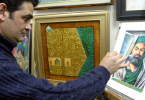theocracy Archive

Despite controversy, religious art increasingly popular in Iraq: Painter Mohammed Hetlr has been preoccupied with drawing and painting sacred Shiite figures from Iraq and around the world. He has been making good money selling his work and, in an interview with Al-Monitor, said that he considered his

Confused discourse of Iran-influenced Shia clerics of Pakistan on Malala Yousufzai: https://www.facebook.com/PoliticalShiaPakistan/posts/10151076529588059 https://www.facebook.com/PoliticalShiaPakistan/posts/313517385422881 https://www.facebook.com/PoliticalShiaPakistan/posts/376123689133495 https://www.facebook.com/PoliticalShiaPakistan/posts/454073991302295 https://www.facebook.com/PoliticalShiaPakistan/posts/378395238903792

Constructing a ‘Secular’ Jinnah: New Project for Pakistani Liberals -by Marvi Sirmed: Originally Published at: BAAGHI As a firm believer in cultural roots rather than oneness through religion, August gives me hope. Flags adorn the cities and marketplaces fill up with the echoes of milli naghmas (patriotic songs) sung in the

Iran: overthrow the fundamentalist cabal – by Ali Abbas Inayatullah: Related articles: LUBP Archive on Iranian theocracy Who will free Pakistan’s Shias from the Iranian-agenda scholars? After watching the hundreds of thousands of protesters in Iran being dismissed as Westernized toffs from Northern Tehran by Islamist groups and self-declared

Relevant question —Gulmina Bilal Ahmad: There are those who believe that Pakistan was envisioned as an Islamic theocracy. If one subscribes to this view, then we have actually become quite a successful state The art of intellect, I have been told, is not just

Blasphemy Law: Mullahs fighting each other for political gains: It seems that Tuhahaffaz Namoos Rasalat (TNR) has become a source of political power for the Mullahs. As expected, where ever there is power, there are contenders. So, intense completion between Mullahs is on where Maulana Fazalur Rehaman (FR)

Political interpretation of religion – by Wahiduddin Khan: Introduction (adapted from Yoginder Sikand’s article in Milli Gazette) Coming to terms with the challenges of modernity has been a major concern of many Muslim scholars and Islamic activists. How can Islam as a universal ideology be expressed in

Parliamentary Theocracy – By Yasser Latif Hamdani: Source Daily Times The 18th Amendment reintroduces the requirement for the prime minister of the country to be a Muslim. Pakistan’s slide down the slippery pole of religiosity is quite clear Frederick Douglass — the great 18th century American

Save the parliament to save the country – by Khalid Wasti: پارلیمینٹ کو بچاؤ ۔۔۔۔۔۔۔ !! ملک کو بچاؤ قائد اعظم کے پاکستان کو ایک ملاں (ملا) کا پاکستان بنانے میں جن غلیظ ذہنوں نے اپنا کردار ادا کیا اور قرارداد مقاصد کی منظوری سے لیکر اسلامی جمہوریہ بنانے تک

Ministry of Religious Affairs of Pakistan: A hard look at the supernatural – by Nadeem Khan: Today, I was amazed to see that the whole website of our Ministry of Religious affairs of Pakistan is as clean, as may be my heart, void of any religious belief (in the insightful eyes of a moulvis). I

Imran’s stand on the Taliban – by Dr Arif Alvi: “We believe in a Pakistan envisioned by Jinnah in his speech of Aug 11, 1947, and an Islam as understood by Iqbal in his well enunciated Reconstruction of Religious Thought in Islam. Pakistan should be a non-theocratic country, though

Was Jinnah Secular? Facts about the creation of Pakistan compiled by Aamir Mughal: I. Ideology Drama was a farce rather hoodwinking the whole Muslim Population The strength of the Muslim League in the Muslim-majority provinces was going to be put to the test during the 1945-46 election campaign. Consequently in the public

Secularism vs Islamism – by Iqbal Akhund: In a recent TV debate on this subject, the applause meter would have given the win to Islamism. The debaters, three on each side, faced a small mixed audience — quite a few girls, many wearing hijabs, also young

The Speech of Mr Sri Chandra Chattopadhyay in Opposition to Objectives Resolution, Constitutent Assembly of Pakistan, 12 March 1949: This is a historic speech and a document that posterity will re-examine because of its ever increasing influence on the amalgamation of religion and politics in Pakistan. Seldom has one piece of legislation caused so much trepidation. Here is

The Rise of Religious Fundamentalism in Pakistan – by Hamza Alvi: Thanks: Hamza Alavi Internet Archive Religious fundamentalism has become a powerful and dangerous force in Pakistan, due mainly to the opportunism of successive political leadership that has pandered to it. Militant sectarian religious groups and parties, led by half-educated
